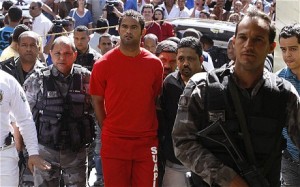Getting Away With Murder on the Soccer Field
By Lorena Campos

Oscar Pistorius
Image Credit: http://www.mirror.co.uk/news/world-news/oscar-pistorius-court-case-adjourned-1930351
The recent case of South African Olympic runner Oscar Pistorius has brought a global awareness to the issue of violence against women. Whether fame, money, and power will temper the ultimate judgement in this case remains to be seen. In another part of the world, an athlete who was involved in an even more horrific attack is being given special privileges. Perhaps drowned out by the heat of the Brazilian carnival is the story of former Flamengo goalkeeper Bruno Fernandes de Souza, who is in prison but now has a formal contract with the Montes Claros Football Club. He is the newest “star” of the team, at least on paper. The athlete was the mastermind of the murder of his ex-lover, Eliza Samudio, in 2010, a case widely reported by the international media.
According to investigations, the 25-year-old model was killed, especially inhumanely. She was kidnapped, tortured, strangled, dismembered, and fed to dozens of dogs. The crime involved several friends, relatives and former employees of the player, but Bruno de Souza – despite having been sentenced to a term of 22 years and three months for the crime – may train and play in the city of Montes Claros. Signed at the end of February, the contract between the goalkeeper and Montes Claros Football Club runs until February 27, 2019, guarantees a salary of $6,768 per year and a $1.21 million (R$2.86 million) termination fee.

Eliza Samudio
Image Credit: http://www.hojeemdia.com.br/minas/advogada-eliza-samudio-era-uma-maria-chuteira-teimosa-mas-inocente-1.116988
The salary is nothing compared to the million dollar figure that the athlete received yearly from one of the biggest soccer clubs in the country, Flamengo, where Bruno was playing at the time of the murder of Eliza Samudio. But the new contract, however, could give Bruno de Souza the opportunity to return to the fields once it has been registered on February 28, with the Minas’ Football Federation. The player’s name was already included in the Daily Newsletter of the main sports organization in the country, the Brazilian Football Confederation, which organizes major football events in the country such as the “Campeonato Brasileiro” and the “Copa do Brasil” in addition to managing the national team.
According to Brazilian Constitution Article VI, every citizen has the right to work. In addition, according to the Law on Execution of Criminal Sentences, the prisoner sentenced to the deprivation of liberty is obligated to work, to the extent of their skills and ability. Now, De Souza’s attorney seeks for his client the benefit of working, even while he is incarcerated. Bruno could go back to the professional soccer arena but he would have to be supervised full time whenever leaving prison.
De Souza only depends on an authorization by a judge to return to training after a hiatus of nearly four years away from professional football. The judge will also have to authorize the transfer from the Presidio Nelson Hungria, in Contagem, where Bruno is currently serving the sentence, to the Regional Presidio in Montes Claros. However, the Court must analyze the behavior of the jailed before any authorization. In De Souza’s case, he has gotten involved already in one serious incident at Presidio Nelson Hungria. According to the Justice, he threatened three people–two incarcerated and one prison guard.

Image Credit: http://www.telegraph.co.uk/news/worldnews/southamerica/brazil/8186757/Brazilian-footballer-jailed-for-kidnapping-girlfriend.html
Some lawyers believe the transfer will never happen due to the popular clamor and De Souza’s bad behavior, while others believe that the player will wear the shirt of the team featuring his nickname–“Bicho”–which is Portuguese for any type of animal, from the harmless to the most harmful pests. The mascot of the Montes Claros Football Club is the “Bicho-papao” or bogeyman, any weird animal used to disrupt a child’s mind.
Ironically, I was born in Montes Claros, where De Souza might play. Throughout my childhood I lived with many different types of violence against women, including some close to my own family. The city is one of ten largest cities in the state of Minas Gerais which has Brazil’s third largest GDP. Two decades have passed since my childhood in Brazil. All of these years have brought some significant changes.
The Brazilian Forum on Public Security report found that violence against women – specifically cases of rape – outweigh those of murder. In 2012, the country recorded 26.1 rapes per 100 thousand inhabitants. The number of homicides was 24.3. The high number, however, is the result of a larger initiative to encourage women to publicly denounce and report rape. We have gotten bolder in reporting this crime, a reflection of important and shifting gender dynamics in twenty first century Brazil.
Nowadays, Brazilian women account for most of the students in universities including higher status graduate courses such as Medicine. Although our salaries still do not reach those of our male population, we hold ,as never before, executive positions. The country’s president is Ms. Dilma Rousseff.
In addition, perhaps the most dramatic change in the way gender is perceived now in Brazilian society is the implementation of Maria da Penha Law, in 2006, which increases the severity of punishments in cases of violence against women in the home environment or family. Increases in per capita income and quality of life, which led to a major expansion of the Brazilian middle-class, also have contributed to a more active female participation in the reporting and prosecuting of crimes. Still much needs to be done.
Montes Claros is situated in the north of Minas Gerais, the poorest region of the state and poverty there is still an obstacle for women. Although the main economic center of the state’s North and on the list of the hundred most populous cities in the country, Montes Claros is only now at a point where cities such as Maringá, in southern Brazil – and with only 145 citizens more than in Montes Claros – are at with a Municipal Human Development Index (MHDI) above average.
In 2000, while Maringa totaled 0.740 for its MHDI; Montes Claros’ MHDI was 0.661. Despite the Brazilian MHDI having grown 47.5 % over the past two decades, according to the United Nations Program for Development, Montes Claros now stands at 0.770 and is still behind Maringa’s 0.808.
In this poor city, if authorized by the Judiciary, Bruno will possibly be greeted with floodlights. A Brazilian channel launched an online poll asking its readers whether they agree or not that Bruno should play for the Montes Claros Football Club even while still jailed. Almost 60% of those polled agree he should play for the club.
The team’s main player also has already said he was “very happy” with the possibility of having the former goalkeeper at the Montes Claros Football Club. The Club’s sponsors as well did not oppose the contract with the athlete and the team’s board of directors conceive De Souza’s coming as a social action.
Montes Claros means “light hills”, but in this scenario – the complete disregard towards women and especially Eliza Samudio’s case should represent the darkness that remains.
________________________________________
 Majored in Journalism, Lorena Campos worked for ‘Hoje em Dia’ and ‘O Norte de Minas’ newspapers in Brazil and while working at the he Minas Gerais State Assembly wrote parliamentary speeches. The journalist also wrote and directed the documentary ‘Latin America: The Geography of The Abortion’ in 2009. She came to the US in 2012 to complete her post-undergraduate studies in International Trade at Baruch College and has worked as a media producer.
Majored in Journalism, Lorena Campos worked for ‘Hoje em Dia’ and ‘O Norte de Minas’ newspapers in Brazil and while working at the he Minas Gerais State Assembly wrote parliamentary speeches. The journalist also wrote and directed the documentary ‘Latin America: The Geography of The Abortion’ in 2009. She came to the US in 2012 to complete her post-undergraduate studies in International Trade at Baruch College and has worked as a media producer.



2 Comments